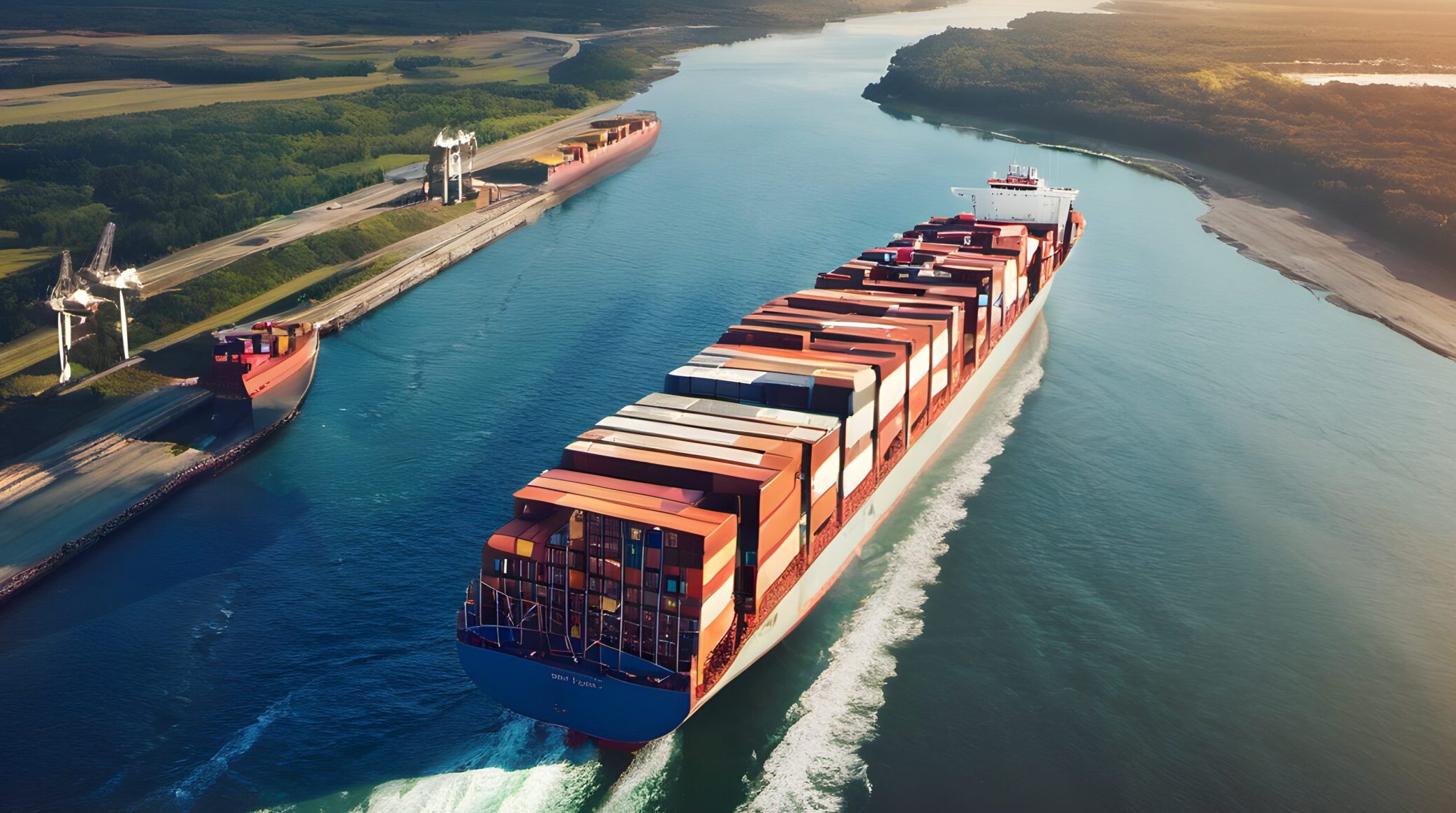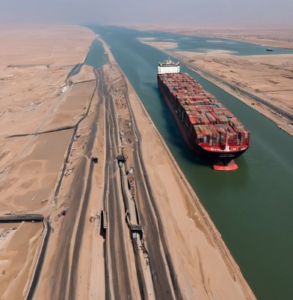
The Importance of the Suez Canal
The Suez Canal, often referred to as the “lifeline of global trade,” has been a cornerstone of Egypt’s economy for over a century. Connecting the Mediterranean Sea to the Red Sea, this narrow waterway provides the shortest sea route between Europe and Asia. Over 10% of global trade flows through this strategic passage, making it one of the busiest and most important shipping lanes in the world. The revenue generated from tolls paid by passing ships has been a significant contributor to Egypt’s national income, providing billions of dollars annually.
However, recent reports indicate that Egypt has experienced a sharp 60% decline in its Suez Canal revenues. This unexpected downturn has raised alarms both within the country and globally. As of late December 2024, the situation has been exacerbated by political instability, economic crises, and regional conflicts that have affected the flow of traffic through the Canal. This article will explore the causes of the revenue drop, the impact on Egypt’s economy, and the broader implications for global trade.
The Current Economic and Political Climate in Egypt
Egypt, under the leadership of President Abdel Fattah al-Sisi, has faced numerous economic challenges in recent years. Despite efforts to modernize its economy and reduce the national debt, the country is grappling with inflation, high unemployment, and a soaring trade deficit. The COVID-19 pandemic and the war in Ukraine further exacerbated these problems, causing a rise in the cost of living and the depreciation of the Egyptian pound.
In 2024, Egypt’s current account deficit quadrupled to $20.8 billion, up from $4.7 billion the previous year, driven in part by the plummeting revenues from the Suez Canal. This economic strain is compounded by political instability in the region, which has impacted Egypt’s international trade and financial partnerships. The country is also dealing with widespread dissatisfaction over the economic reforms imposed under an $8 billion International Monetary Fund (IMF) agreement, which mandates subsidy cuts and currency flotation.
These factors have created a volatile environment, severely affecting the country’s ability to maintain its position as a key player in global trade. While the Egyptian government has attempted to implement austerity measures and restructure the economy, the results have been mixed, and public frustration continues to grow.
Regional Instabilities Affecting the Suez Canal
The Suez Canal’s revenue drop cannot be understood in isolation; it is closely linked to the political and security situation in the region. In recent months, the rise in regional instability has disrupted trade routes, making the Suez Canal less reliable as a passage for ships.
One of the main contributing factors to the decline in Canal traffic has been the series of attacks by Houthi rebels in Yemen. Since November 2024, the Houthis have launched missile and drone strikes against shipping vessels passing through the Red Sea, which connects to the Suez Canal. This has caused significant disruptions, forcing many shipping companies to reroute their vessels around the African continent to avoid the growing risks. These alternative routes, while longer and more expensive, have become increasingly attractive for shippers seeking to avoid the volatile waters of the Red Sea.
The rerouting of ships has had a direct impact on the volume of traffic passing through the Suez Canal, leading to a sharp drop in toll revenue. Moreover, the delay in deliveries and the rising cost of goods in transit have created ripple effects throughout the global supply chain, particularly in industries like manufacturing, oil, and gas. The Suez Canal’s strategic position has always been its strength, but as regional tensions mount, its role in global commerce has become more uncertain.
The Revenue Decline: Causes and Implications
The Suez Canal is a key source of foreign currency for Egypt, contributing significantly to the country’s GDP. In 2023, revenues from the Canal reached approximately $9 billion. However, the latest reports indicate a staggering 60% decrease in these revenues in 2024. This decline has been primarily driven by the combination of regional instability, the rise of alternative shipping routes, and a slowdown in global trade.
Several factors have contributed to the revenue decline:
-
Regional Conflicts: As discussed, the Houthi attacks and other regional tensions have disrupted shipping routes in the Red Sea, forcing ships to seek safer alternatives. This has reduced the number of vessels passing through the Canal, directly impacting Egypt’s revenue.
-
Global Supply Chain Issues: The ongoing global supply chain crisis, worsened by inflation and geopolitical tensions, has led to a reduction in the demand for goods, especially from Asia to Europe and the U.S. This has caused fewer ships to traverse the Suez Canal, further affecting Egypt’s revenue.
-
Increased Shipping Costs: With the disruptions in global shipping routes, the cost of transporting goods has risen significantly. This has led to a reduction in the number of shipments and, consequently, fewer toll payments to Egypt.
-
Economic Slowdown: As global demand for products has softened, fewer goods are being transported via the Suez Canal. This slowdown in international trade has naturally led to a reduction in the Canal’s revenue.
The implications of this revenue loss are severe for Egypt. With a large portion of the country’s foreign currency earnings relying on the Canal, this decline is straining Egypt’s financial position. The country is also facing an increase in the trade deficit, with imports far outpacing exports. As a result, Egypt is being forced to seek additional loans and financial assistance from international organizations like the IMF, which has set strict austerity measures in place to stabilize the economy.
Efforts to Address the Crisis
Despite these challenges, the Egyptian government has outlined several strategies to counter the decline in Suez Canal revenues and restore the waterway’s importance to global trade. President al-Sisi has emphasized the need for modernization efforts and infrastructure projects to increase the Canal’s capacity and attract more ships.
-
Infrastructure Expansion: The expansion of the Suez Canal’s southern sector and the development of additional bypasses are key components of the modernization plan. These upgrades aim to accommodate larger ships and improve the flow of traffic through the Canal, ensuring that it remains competitive compared to alternative routes.
-
Technological Advancements: The Egyptian government has been investing in digitalization and automation to improve the efficiency of the Canal. New technologies, such as automated traffic management systems and advanced navigational tools, are expected to reduce waiting times and enhance the overall efficiency of the waterway.
-
Marketing and Diplomacy: To mitigate the effects of the decline, Egypt is also focusing on enhancing its relationships with global trade partners. Through diplomatic efforts, Egypt aims to attract more international shipping companies to use the Canal, particularly targeting emerging markets in Asia and Africa.
-
Diversification of Revenue Sources: While the Suez Canal remains Egypt’s primary foreign currency earner, the country has been exploring other avenues for generating income, such as tourism, agriculture, and manufacturing. Diversifying revenue streams will help reduce Egypt’s reliance on Canal tolls and improve its economic resilience.
Global Trade and the Suez Canal’s Strategic Importance
Despite the current challenges, the Suez Canal remains an essential component of global trade. More than 10% of global trade passes through the waterway, making it one of the busiest and most important maritime corridors in the world. The Canal is especially vital for the transportation of oil, natural gas, and containerized goods between Europe, the Middle East, and Asia.
In 2024, the Canal saw an estimated 50 ships pass through each day. This daily traffic represents billions of dollars in goods, from electronics to crude oil. The importance of the Canal in the context of global supply chains cannot be overstated. In the event of prolonged disruptions, the global economy could face significant delays and cost increases, further exacerbating the existing supply chain crisis.
Although alternative shipping routes around Africa have become more popular due to recent security concerns, the Suez Canal remains the most cost-effective and time-efficient route for most vessels. As a result, efforts to stabilize and modernize the Canal will likely pay off in the long run, as the global demand for efficient shipping routes remains strong.
The 60% revenue drop from the Suez Canal in 2024 is a wake-up call for Egypt. The combination of regional instability, political turmoil, and a slowdown in global trade has had a profound impact on the country’s economy. However, Egypt is not without hope. The government’s plans to modernize the Canal, improve infrastructure, and enhance international relations offer a path forward to restore its critical role in global trade.
For the international community, the Suez Canal remains a vital artery of global commerce. The situation in Egypt underscores the vulnerability of global supply chains to political and regional conflicts. As Egypt continues to navigate these challenges, the Suez Canal’s future will depend on a careful balance of economic reforms, diplomatic efforts, and investments in modernizing its infrastructure.
In the coming years, the world will be watching closely to see how Egypt manages this crisis and whether the Suez Canal can continue to serve as a cornerstone of global trade. Only time will tell if these efforts will succeed in restoring its once-thriving revenue stream.
Feel free to check out our other website at : https://synergypublish.com

